|
People of
 the Middle Ages
the Middle Ages Knights - Crusaders 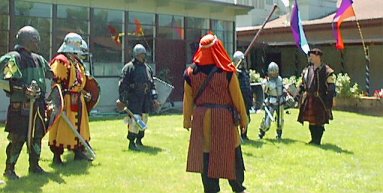 Noblemen who sought to help recapture the Holy Lands from the Turks are Knight-Crusaders. Crusader comes from the Latin word crux, meaning cross. Crusaders often use the cross as a symbol. Sir Richard is a knight and a nobleman. He owns land. His job is to protect his land and people, and see that his people live peacefully together, keeping the laws of the realm. He is lord of many less powerful knights. Men-at-Arms
Sir Richard spends much of his life making war on enemy barons. His knights and men-at-arms must be well trained and always ready for battle. They practice fighting by having jousts and tournaments. You will attend a joust and tournament during your stay at the castle. Royalty & Religion 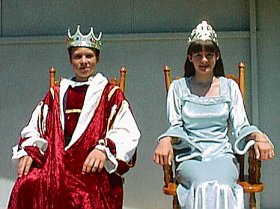 In
the year of our Lord 1239 - God is obeyed through his Church, which has its own leaders. The Pope is the Church's ruler. A priest is the religious leader of the people in his parish. His lord is the bishop, who has many parishes and a great church called a cathedral. The Bishops are the noblemen of the church. They sometimes have large land holdings and knights under them. The Church stands for mercy, piety and dignity of all before God. For many of the poor, rising in the ranks of the church is their only chance to become the equal of a noble. A friar is a priest without a parish. Friars travel about trying to serve God by teaching and preaching. They visit in the towns and villages, and in the homes of the nobles. Sometimes they spend their days reading to the Lords and Ladies; and bringing them news from afar, the latest teaching on philosophy and science. Monks and nuns are people who have promised to serve God by work and prayer, and sometimes by teaching and helping people. Monks leave the company of ordinary men to live together, away from the affairs of the world and worldly temptations. They have taken vows of obedience, poverty and chastity. Their first concern is to save their own souls. Many are well educated, and as time passes monasteries are becoming centers of learning. Nuns are religious women who leave their homes to live together in order to save their souls. The church welcomes all, and not doubt many women enter nunneries to escape their life of hardship.
Many noble ladies live in the castle. The Lady Elena gives
them a home and helps teach the young girls. In return they
help and obey her. They spend their days, not in leisure,
but busy attending the business of castle life. They supervise
the upbringing of the children. They give instructions to
the servants on the day-to-day running of the castle.
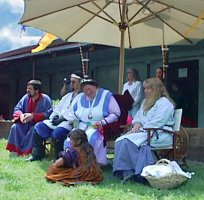
Sometimes the friars read to them, or discuss the
latest studies of philosophy or science. A few of these noblewomen
are among the best educated people in Europe. Some become
troubadours themselves, like the famous Marie de France. Troubadours
Some Knights are also poets and musicians, like these traveling
minstrels. The knights are called troubadours. No one
is certain when troubadours began to appear. We do know that
most of their songs dealt with love between knights and ladies,
of gallant deeds the knights performed and the inspiration of their
ladies for those deeds. Minstrels live by entertaining people
with songs and stories and the latest news. They wander from
place to place - everyone welcomes their visits. Servants & Serfs The steward is Sir Richard's head servant. He can read and write a bit, and do large sums. Few others of his station can do this. One of the steward's jobs is to settle quarrels and punish criminals. Sir Richard's stewards and bailiffs are his police.
The serfs own nothing. They are slaves. Many are the children of foreigners who were captured in war and sold to the rich noblemen. They live on the baron's land, grow their own food and work in his fields.
|
 Everyone
you will meet during your visit with Sir Richard has special duties
and work to do. These people live a hard and dangerous life. They
are born to a social position, each its with specific duties, and
have little chance of changing their lot in life. The comfort and
safety of each person depends on the work of all the others.
For example, there must be a strong leader, like Sir Richard, to
protect people from enemies and criminals. But the baron needs
his people, too - to work and fight for him. The people you
will meet here are not real historical figures - at least so far
as we know. But all the things they do are things real people
have done. Since books and museums cannot show us everything
we want to know about this enchanting period of history - we have
invented a barony in cyberspace. Now you can go back in time
to see how a castle looked when the fire was roaring on the hearth,
and the tapestries were bright, and the people were talking and
laughing in the candle-light. Come ye, now - meet the residents
of our realm!
Everyone
you will meet during your visit with Sir Richard has special duties
and work to do. These people live a hard and dangerous life. They
are born to a social position, each its with specific duties, and
have little chance of changing their lot in life. The comfort and
safety of each person depends on the work of all the others.
For example, there must be a strong leader, like Sir Richard, to
protect people from enemies and criminals. But the baron needs
his people, too - to work and fight for him. The people you
will meet here are not real historical figures - at least so far
as we know. But all the things they do are things real people
have done. Since books and museums cannot show us everything
we want to know about this enchanting period of history - we have
invented a barony in cyberspace. Now you can go back in time
to see how a castle looked when the fire was roaring on the hearth,
and the tapestries were bright, and the people were talking and
laughing in the candle-light. Come ye, now - meet the residents
of our realm!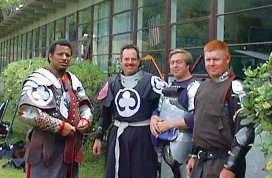 A man-at-arms has the arms and equipment of a knight, but not the
title of a knight. A squire must be of noble birth - the son
of another knight, or someone with a title, such as the baron.
He is a trainee knight. You may become a Knight by training
as a squire or by showing great skill and bravery in battle.
A foot soldier is a fighting man who is not of noble birth. Knights
always fight on horseback.
A man-at-arms has the arms and equipment of a knight, but not the
title of a knight. A squire must be of noble birth - the son
of another knight, or someone with a title, such as the baron.
He is a trainee knight. You may become a Knight by training
as a squire or by showing great skill and bravery in battle.
A foot soldier is a fighting man who is not of noble birth. Knights
always fight on horseback. 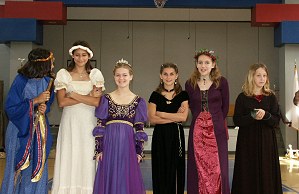 Noblewomen
Noblewomen
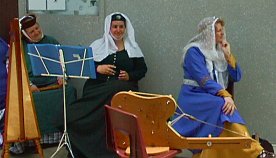 Some
of their time is spent making medicines from herbs and tending to
the sick and the poor. In her garden, Lady Elena has mint, thyme,
fennel, parsley, sage and hyssop to use for cooking, and for medicine.
But, she says, "The best doctors are Dr. Quiet, Dr. Merry and Dr.
Diet." M'lady is able to read, and teaches
reading to the pages and squires. The women also weave, embroider,
sew fine garment, cushions or tapestries. As they work at
their crafts they listen to the songs and poems of troubadours.
Some
of their time is spent making medicines from herbs and tending to
the sick and the poor. In her garden, Lady Elena has mint, thyme,
fennel, parsley, sage and hyssop to use for cooking, and for medicine.
But, she says, "The best doctors are Dr. Quiet, Dr. Merry and Dr.
Diet." M'lady is able to read, and teaches
reading to the pages and squires. The women also weave, embroider,
sew fine garment, cushions or tapestries. As they work at
their crafts they listen to the songs and poems of troubadours.

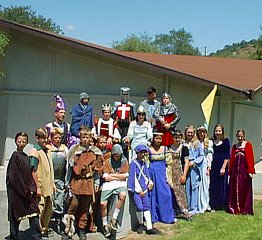 Sir Richard and Lady Elena's servants wake early to light the
castle fires and prepare breakfast for the household. The
servants are responsible for all of the tasks necessary to keep
the castle running smoothly. They tend the livestock and
gardens, cook the food, carry the bath water, look after the children.
And in times of siege, lay down their lives for the nobles.
Sir Richard and Lady Elena's servants wake early to light the
castle fires and prepare breakfast for the household. The
servants are responsible for all of the tasks necessary to keep
the castle running smoothly. They tend the livestock and
gardens, cook the food, carry the bath water, look after the children.
And in times of siege, lay down their lives for the nobles. send email to Sir Dragon Tamer
send email to Sir Dragon Tamer